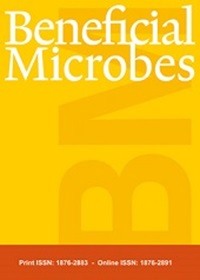Ageing and the gut-brain axis: lessons from the Drosophila model
IF 3
4区 医学
Q2 MICROBIOLOGY
引用次数: 0
Abstract
The steady decline of physiological function and increased vulnerability to age-related disorders are two features of the complicated biological process of ageing. As a key organ for nutrient absorption, metabolism, and immunological regulation, the gut plays a major part in the ageing process. Drosophila melanogaster, a well-established model organism, has emerged as a significant tool for exploring the intricate rapport between the gut and ageing. Through the use of Drosophila models, the physiological and molecular elements of the gut-brain axis have been thoroughly explored. These models have also provided insights into the mechanisms by which gut health impacts ageing and age-related illnesses. Drosophila’s gut microbiota experience dysbiosis with age which has been linked to age-related diseases. To prevent this and promote healthy ageing in Drosophila, gut microbiota modification methods, such as dietary restriction in tandem with time-restricted feeding, administration of pro-, pre- and synbiotics, as well as pharmaceutical interventions have been generated with positive impacts. The article also covers the drawbacks and difficulties of investigating the gut via the Drosophila. Thus, with an emphasis on the lessons discovered from Drosophila research, this review provides an extensive description of the current studies on the role of the gut-brain axis in ageing and health.衰老与肠道-大脑轴:果蝇模型的启示
生理功能持续衰退和更容易患上与年龄有关的疾病是老龄化这一复杂生物过程的两个特征。作为营养吸收、新陈代谢和免疫调节的关键器官,肠道在衰老过程中扮演着重要角色。黑腹果蝇作为一种成熟的模式生物,已成为探索肠道与衰老之间错综复杂关系的重要工具。通过使用果蝇模型,人们对肠道-大脑轴的生理和分子要素进行了深入探讨。这些模型还让人们深入了解了肠道健康对衰老和老年相关疾病的影响机制。果蝇的肠道微生物群随着年龄的增长而出现菌群失调,这与老年相关疾病有关。为了防止这种情况的发生并促进果蝇的健康老化,人们采用了改变肠道微生物群的方法,如饮食限制和限时喂养、给予益生菌、益生元和合成益生菌以及药物干预等,并取得了积极的效果。文章还介绍了通过果蝇研究肠道的缺点和困难。因此,这篇综述以果蝇研究中发现的经验教训为重点,广泛介绍了目前关于肠道-大脑轴在衰老和健康中的作用的研究。
本文章由计算机程序翻译,如有差异,请以英文原文为准。
求助全文
约1分钟内获得全文
求助全文
来源期刊

Beneficial microbes
MICROBIOLOGY-NUTRITION & DIETETICS
CiteScore
7.90
自引率
1.90%
发文量
53
审稿时长
>12 weeks
期刊介绍:
Beneficial Microbes is a peer-reviewed scientific journal with a specific area of focus: the promotion of the science of microbes beneficial to the health and wellbeing of man and animal. The journal contains original research papers and critical reviews in all areas dealing with beneficial microbes in both the small and large intestine, together with opinions, a calendar of forthcoming beneficial microbes-related events and book reviews. The journal takes a multidisciplinary approach and focuses on a broad spectrum of issues, including safety aspects of pro- & prebiotics, regulatory aspects, mechanisms of action, health benefits for the host, optimal production processes, screening methods, (meta)genomics, proteomics and metabolomics, host and bacterial physiology, application, and role in health and disease in man and animal. Beneficial Microbes is intended to serve the needs of researchers and professionals from the scientific community and industry, as well as those of policy makers and regulators.
The journal will have five major sections:
* Food, nutrition and health
* Animal nutrition
* Processing and application
* Regulatory & safety aspects
* Medical & health applications
In these sections, topics dealt with by Beneficial Microbes include:
* Worldwide safety and regulatory issues
* Human and animal nutrition and health effects
* Latest discoveries in mechanistic studies and screening methods to unravel mode of action
* Host physiology related to allergy, inflammation, obesity, etc.
* Trends in application of (meta)genomics, proteomics and metabolomics
* New developments in how processing optimizes pro- & prebiotics for application
* Bacterial physiology related to health benefits
 求助内容:
求助内容: 应助结果提醒方式:
应助结果提醒方式:


